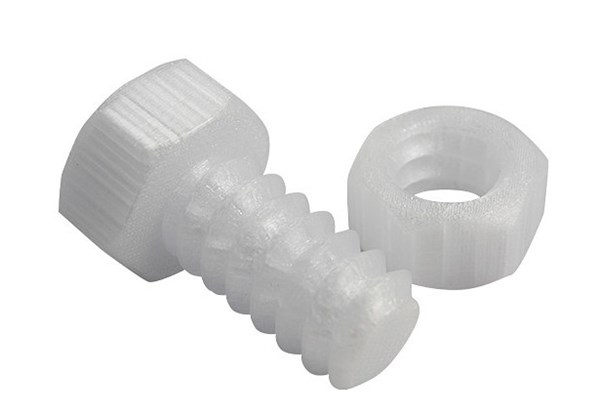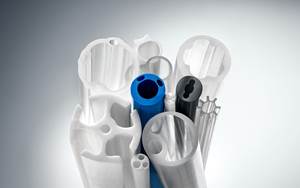New Line Of Polycarbonate-Based 3D Printing Materials
While 3D printing is clearly gaining traction, one of the biggest drawbacks is the limitation of materials suitable for 3D printing.

While 3D printing is clearly gaining traction, one of the biggest drawbacks is the limitation of materials suitable for 3D printing. Covestro, formerly Bayer MaterialScience, says its working on changing that. For instance, while polycarbonate (PC) is still one of the most widely used thermoplastics in the world, it’s been a slow start in using it for 3D printing applications due to its high melting temperature. To date, PC has only been available to those with expensive industrial 3D printers, or a very niche set of extrusion-based desktop 3D printers. But it might not be that way for long.
Covestro and Polymaker, a Shanghai, China-based producer of high-quality filament for extrusion-based desktop 3D printers, have developed Polymaker PC, a new line of polycarbonate-based materials specifically designed for extrusion-based desktop 3D printers
The first two members of this new material family are Polymaker PC-Plus and PC-Max, which have been formulated and engineered to bring PC to the extrusion-based desktop 3D printers. They have reportedly achieved this by lowering the printing temperatures from 300 - 320 ºC down to a moderate 250 - 270 ºC, and significantly improving the warping resistance. Polymaker PC-Max further offers advanced mechanical properties—toughness, in particular—making it suitable for mechanically demanding applications.
Covestro provided the raw polycarbonate resins for Polymaker PC. Polymaker’s material scientists work closely with the Covestro team to enhance the formulation of the PC 3D filament to imbue it with "unprecedented properties and functionalities" for 3D printing.
“We see the integration of our high-tech polymer materials in the field of 3D printing as a means to drive next-generation design and production solutions. We are very excited to work with Polymaker as we enter this burgeoning industry,” said Tim Efthimiady, senior vice president of the polycarbonate business unit of Covestro.
Here’s a well-made video detailing the process:
Some of the key advantages of Polymaker PC compared to existing 3D printing materials include heat resistance as those made with Polymaker PC will withstand temperatures of well over 100 °C. The companys say this makes it ideal for lighting, engineering, and practically any device or part that requires good structural stability when exposed to heat.
Additional functional properties include intrinsic flame retardance, optical clarity, and resistance to chemicals and solvents. Polymaker will continue to develop new functional 3D printing materials based on PC.
“Polycarbonate has properties that make it very desirable for the 3D printing community as a whole, and Polymaker PC makes it even better for creative designers and engineers at every stage of the production process” said Xiaofan Luo, CEO of Polymaker. “Its excellent engineering and functional properties open doors to new projects and applications that were not previously possible to those with desktop 3D printers.”
“We look forward to working with the entire community—printer manufacturers, software developers, designers, and makers—in further developing Polymaker PC,” said Aaron Jennings, marketing and communications manager for Polymaker. “We want to help users of 3D printing achieve their goals, and to open new possibilities for 3D printing.”
Related Content
The Connector Conundrum: 3D Printed Mold Tooling’s Role in Innovation
ReelView Fishing faced an electronics obstacle in the development of its new technology for underwater video. Additive manufacturing for moldmaking allowed for the speed necessary to iterate to a solution. How inventors and invention will benefit from new ways of obtaining production-ready tooling.
Read MoreNPE 2024: Additive Manufacturing Assisting, Advancing Plastics Processing
Exhibitors and presenters at the plastics show emphasized 3D printing as a complement and aid to more traditional production processes.
Read MoreMedical Manufacturer Innovates with Additive Manufacturing and Extrusion Technology Hubs
Spectrum Plastics Group offers customers two technology hubs — one for extrusion, the other for additive manufacturing — to help bring ground-breaking products to market faster.
Read More3D Printed Spine Implants Made From PEEK Now in Production
Medical device manufacturer Curiteva is producing two families of spinal implants using a proprietary process for 3D printing porous polyether ether ketone (PEEK).
Read MoreRead Next
See Recyclers Close the Loop on Trade Show Production Scrap at NPE2024
A collaboration between show organizer PLASTICS, recycler CPR and size reduction experts WEIMA and Conair recovered and recycled all production scrap at NPE2024.
Read MoreFor PLASTICS' CEO Seaholm, NPE to Shine Light on Sustainability Successes
With advocacy, communication and sustainability as three main pillars, Seaholm leads a trade association to NPE that ‘is more active today than we have ever been.’
Read More
























